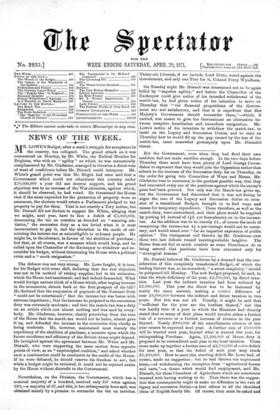The defence was not very strong. Mr. Lowe fought, it
is true, for his Budget with some skill, declaring that the real objection was not to his method of raising supplies, but to his estimates, which the House had sanctioned; and had indeed demanded. What would foreign nations think of a House which, after urging increase in the armaments, shrank back at the first prospect of the bill? He declared that the suspension of payment of the National Debt "could not be entertained ;" that the income-tax was borne with extreme impatience ; that the increase he proposed to the succession duty was extremely moderate ; and that the match-tax was a duty on an article which cost almost nothing and was used by every- body. Mr. Gladstone, however, clearly perceiving from the tone of the House that the match-tax would not be borne, almost gave it up, and defended the increase in the succession duty chiefly as being moderate. He, however, maintained most warmly the expediency of the abolition of purchase, a measure upon which the future excellence and efficiency of the British Army might depend. He inveighed against the agreement between Mr. White and Mr. Disraeli, who were supporting the same motion from opposite points of view, as an "unprincipled coalition," and asked whether such a combination could be conducive to the credit of the House. If he were defeated, he should reserve his freedom to act ; but while a budget might be reviewed, it could not be rejected entire by the House without discredit to the Government.


































